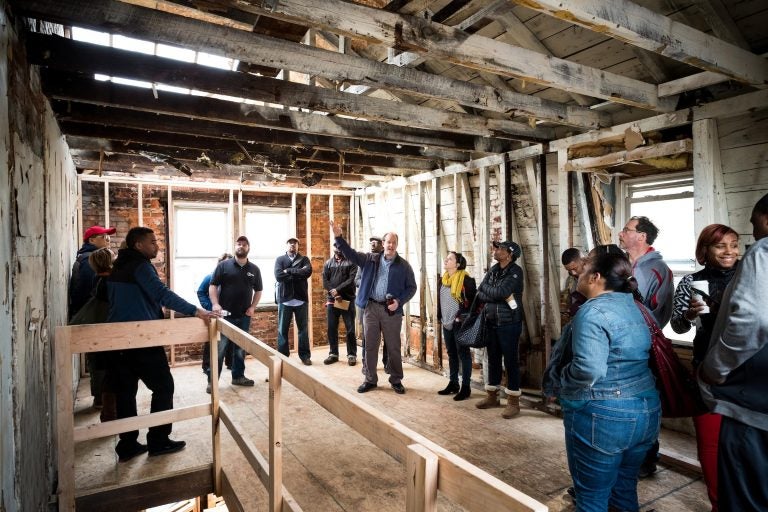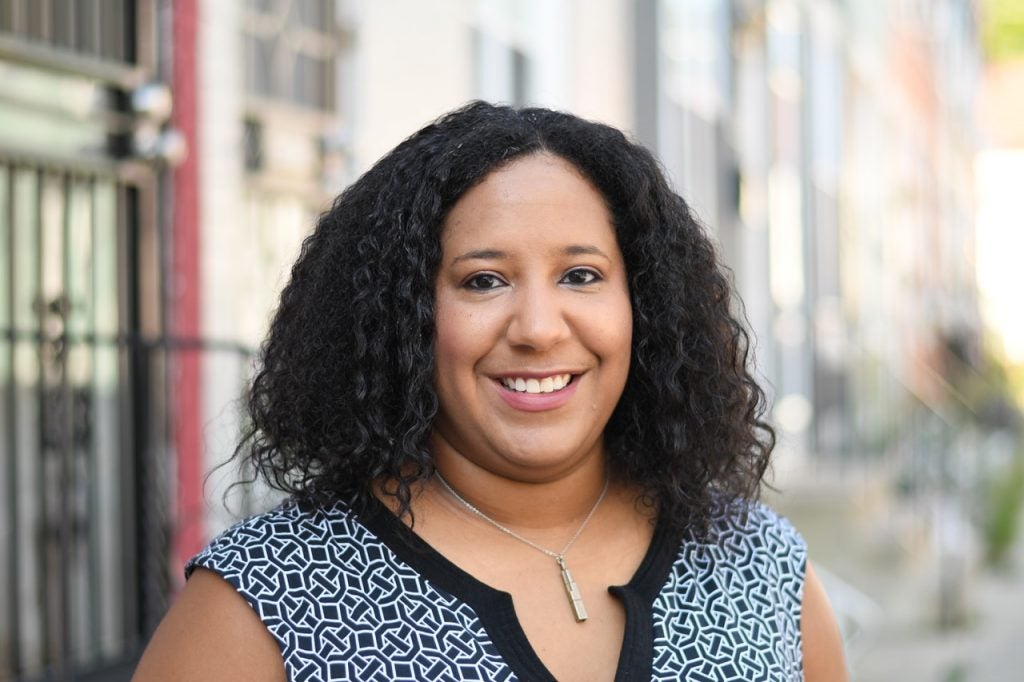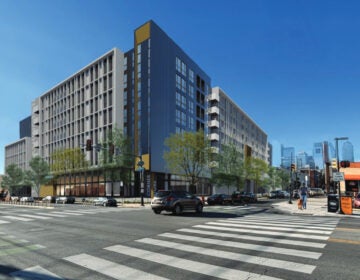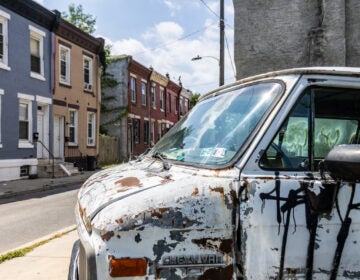Show me the money: Jumpstart Philly announces $3 million in loans for neighborhood developers
The program, along with new backing from Reinvestment Fund, aims to help aspiring developers move forward with projects across the city.

Jumpstart Germantown participants talk development at a project site. (Courtesy of Jumpstart Germantown)
When Tya Winn first heard about Jumpstart Germantown, a training and loan-providing initiative for budding neighborhood developers, she wanted something like it in West Philadelphia, too.
Thanks to $3 million in loan support for local real estate projects backed by Reinvestment Fund, announced Wednesday by Jumpstart Philadelphia, she’s getting it. The low-interest loans will go toward helping aspiring Philadelphia developers move forward with projects across the city.
“Real estate is an incredibly difficult field to break into because it requires money and it requires knowledge,” said Winn. “The biggest success of Jumpstart is that it makes the field more accessible. It lowers the barriers to entry.”
Winn currently works in real estate as the director of project planning at Habitat for Humanity. The Jumpstart program was “kind of the buzz” in West Philadelphia four years ago, when she served as chair of the West Philadelphia Promise Zone housing committee. There, she and her colleagues discussed ways to prevent displacement, combat gentrification, teach residents about the development process and how they could benefit from it, and protect their rights as the neighborhood changed.
In 2018, she and a team of colleagues launched the training and networking program for Jumpstart West Philly. The program, like other Jumpstart chapters in neighborhoods including the Southwest, Kensington, Tioga and Hunting Park, was modeled after the first Jumpstart program rolled out in Germantown by developer Ken Weinstein, president & CEO of Philly Office Retail. Initial funding came from The Barra Foundation. But there was not enough money for the kind of robust loan program needed to address the financial challenges that stymie developers starting out who don’t have access to family wealth or other sources of investment capital.
Until now.
“We can train and mentor aspiring developers all day, but if you can’t loan them money, they’re not going to get very far,” Weinstein said. “It’s very difficult to get started if you don’t have one or two renovations under your belt, and that ends up excluding newer developers, people less connected, and people who don’t have family in the business… mostly women and people of color.”
The knowledge: training and mentorship programs citywide
Weinstein said he was completely surprised by the demand for Jumpstart when the program began.
“I had no idea there was this kind of demand for training and networking and financial resources — we started off holding training sessions for 10 people, which went to 20, which went to 35. It’s now 65 every session.”
But Winn is quick to acknowledge the appeal. Jumpstart, she said, is about creating opportunity and access. As a black woman, she said, “I look across most of the cities in this country, and there are very few developers that look like me. For many people, that [knowledge] seems so far, so unattainable, so impossible … but we all live our lives in buildings. I think it’s kind of demystifying it, breaking it down into these very bite-size pieces that help people understand.”

That means, too, that participants in the Jumpstart program can be incredibly diverse. Jumpstart West Philly has trained young people, people with families, older folks looking to leave their careers but continue to generate income, advocates wanting to create better quality housing in their own communities, and more.
“Our demographics have been all over. I don’t think we have a typical person,” she said.
Still, Winn added, there are commonalities. “They all see real estate as an avenue of both individual wealth creation but also neighborhood stabilization and revitalization.”
Jumpstart Germantown has produced 625 graduates, and Weinstein’s office estimated that there are 250 graduates of the other neighborhood Jumpstart programs. Since fall and winter schedules are in full swing, that brings the total to almost 900 aspiring local developers — and counting.
The money: low-interest loans for new developers
But those aspiring developers need support. That’s why Reinvestment Fund, a financial nonprofit that specializes in community development project support, is backing $3 million in new loans to support projects throughout Philadelphia.
“As cities have sort of reemerged as places of choice, you’ve seen the increasing divide between the haves and the have-nots, with disinvestment in some places and gentrification in other places,” said Andy Rachlin, managing director of Reinvestment Fund. “And those macroeconomic and political trends had us at RF thinking: How do we address that set of issues?”
Their answer? Supporting a program like Jumpstart, which was already drawing from experience and connections in both the development world and in local neighborhoods.
“Their secret sauce, if they have one,” Rachlin added, “is that they understand what it takes to do the job.”
For Weinstein, this is just the beginning. He wants to “blow through” the $3 million in loans by January, and he’s hoping that additional funding becomes available to expand the program again then.
“I think, looking down the road, that this is going to spread further,” he said.
And if it’s easily replicable in Philadelphia, why stop there? Weinstein’s been talking to organizers in Chicago and Milwaukee, watching plans develop for Jumpstart programs in New Jersey and Delaware.
“It’s only a matter of time until this goes on the road,” he said.
WHYY is your source for fact-based, in-depth journalism and information. As a nonprofit organization, we rely on financial support from readers like you. Please give today.







